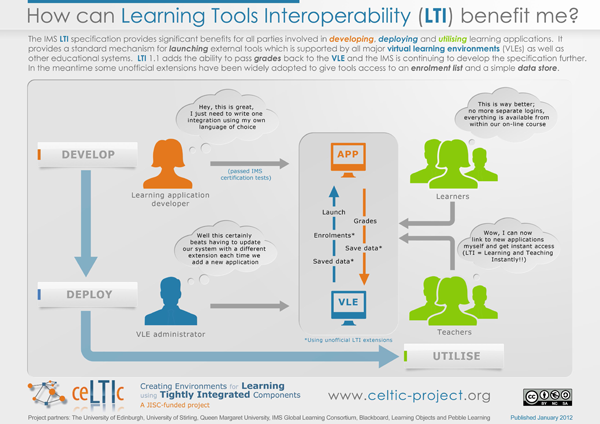IMS Learning Tools Interoperability: Difference between revisions
m (→Introduction) |
m (→Links) |
||
| (6 intermediate revisions by the same user not shown) | |||
| Line 7: | Line 7: | ||
{{quotation|Learning Tools Interoperability (LTI)™ is a specification developed by IMS Global Learning Consortium. The principal concept of LTI is to establish a standard way of integrating rich learning applications (often remotely hosted and provided through third-party services) with platforms like learning management systems, portals, or other educational environments. In LTI these learning applications are called Tools (delivered by Tool Providers) and the LMS, or platforms, are called Tool Consumers.}} ([http://developers.imsglobal.org/ What is Learning Tools Interoperability™?] (IMS, retrieved 4/2013) | {{quotation|Learning Tools Interoperability (LTI)™ is a specification developed by IMS Global Learning Consortium. The principal concept of LTI is to establish a standard way of integrating rich learning applications (often remotely hosted and provided through third-party services) with platforms like learning management systems, portals, or other educational environments. In LTI these learning applications are called Tools (delivered by Tool Providers) and the LMS, or platforms, are called Tool Consumers.}} ([http://developers.imsglobal.org/ What is Learning Tools Interoperability™?] (IMS, retrieved 4/2013) | ||
See also: | |||
* [[Moodle]] (some info about its LTI support) | |||
History of specifications: | History of specifications: | ||
| Line 23: | Line 26: | ||
'''Specifications''' | '''Specifications''' | ||
* Base URL: http://www.imsglobal.org/lti/ | |||
* [http://www.imsglobal.org/lti/index.html Version 2.0 - Public Draft Specification] (retrieved April 2013). | * [http://www.imsglobal.org/lti/index.html Version 2.0 - Public Draft Specification] (retrieved April 2013). | ||
* [http://www.imsglobal.org/specificationdownload.cfm V 1.1 final (several files)] | * [http://www.imsglobal.org/specificationdownload.cfm V 1.1 final (several files)] | ||
'''Lists of LTI enabled tools''' | |||
* [http://developers.imsglobal.org/catalog.html List of IMS LTI Certified tools] | |||
* [https://www.edu-apps.org/index.html Edu Apps]. Generic list of "educational apps" that are based on LTI. | |||
'''Other''' | |||
* [http://www.imsglobal.org/cc/statuschart.cfm LTS Tools list and status] (at IMS) | |||
* [http://www.role-widgetstore.eu/tool/basic-lti-consumer-widget Basic LTI Consumer Widget] (EU Role project) | |||
* [https://confluence.sakaiproject.org/display/KERNDOC/KERN-566+IMS+Basic+LTI+Consumer SAKAI 3 LMS planning doc] | |||
[[Category:e-learning tools]] | [[Category:e-learning tools]] | ||
[[Category:standards]] | [[Category:standards]] | ||
Latest revision as of 17:54, 9 April 2014
Introduction
“IMS LTI complements the Common Cartridge standard with access to rich, web-based applications or Tools embedded into cartridges with active, authenticated links back to the centrally hosted content. High stakes or premium content can be integrated into specific learning contexts and support the retrieval of results, making the value of eBooks and online content a reality.”. (IMS GLC Common Cartridge Profile: Implementation
“Learning Tools Interoperability (LTI)™ is a specification developed by IMS Global Learning Consortium. The principal concept of LTI is to establish a standard way of integrating rich learning applications (often remotely hosted and provided through third-party services) with platforms like learning management systems, portals, or other educational environments. In LTI these learning applications are called Tools (delivered by Tool Providers) and the LMS, or platforms, are called Tool Consumers.” (What is Learning Tools Interoperability™? (IMS, retrieved 4/2013)
See also:
- Moodle (some info about its LTI support)
History of specifications:
- LTI v1.1 was released in March 2012
- LIT v1.1.1 was released in July 2012.
- LTI 2.x is a draft specification as of April 2013.
Links
Introductions
- What is Learning Tools Interoperability™? (IMS, retrieved 4/2013).
- The basic overview on how LTI ™ works (IMS, retrieved 4/2013).
Specifications
- Base URL: http://www.imsglobal.org/lti/
- Version 2.0 - Public Draft Specification (retrieved April 2013).
- V 1.1 final (several files)
Lists of LTI enabled tools
- List of IMS LTI Certified tools
- Edu Apps. Generic list of "educational apps" that are based on LTI.
Other
- LTS Tools list and status (at IMS)
- Basic LTI Consumer Widget (EU Role project)
- SAKAI 3 LMS planning doc
